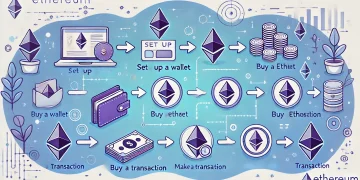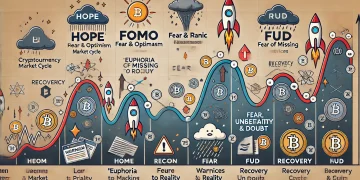Blockchain technology has gained attention in recent years as a revolutionary tool, promising profound impacts on various sectors, including finance, healthcare, and supply chain management. Blockchain’s ability to enhance transparency, improve traceability, and reduce costs has made it an increasingly attractive option for solving complex supply chain challenges. This article explores how blockchain is transforming supply chain management, covering its impact on transparency, security, efficiency, and sustainability.
Understanding Blockchain Technology
Blockchain is a digital, decentralized ledger that records transactions across a network of computers. Its fundamental attributes include:
- Decentralization: Unlike traditional ledgers, which are typically controlled by a single entity, blockchain operates on a decentralized network, making it more resistant to data tampering and cyberattacks.
- Transparency: Every participant in the network has access to the same version of the data, enhancing transparency and trust among all parties.
- Immutability: Once recorded, data on the blockchain cannot be altered without the consensus of the network, providing an incorruptible record.
These features make blockchain an ideal technology for applications that require high levels of trust, transparency, and data integrity—qualities essential in supply chain management.
Current Challenges in Supply Chain Management
Before diving into how blockchain can help, it’s important to understand some of the pressing issues in traditional supply chains:
- Lack of Transparency: Traditional supply chains often involve multiple intermediaries, making it challenging to track goods’ origin, movements, and final destination accurately.
- High Risk of Fraud and Errors: Fraudulent activities, counterfeiting, and administrative errors are common in many industries, resulting in significant financial losses and reputational damage.
- Inefficiencies: Traditional supply chains rely heavily on paperwork, which can lead to delays, increased costs, and inefficiencies in communication.
Blockchain’s core functionalities address these issues by enabling transparent, tamper-proof, and streamlined supply chain processes.
Blockchain in Supply Chain: A Game-Changer
Blockchain technology is designed to solve issues that have long plagued traditional supply chains. Here’s how:
- Enhanced Transparency: Every transaction is recorded on a shared ledger, visible to all stakeholders. This level of transparency builds trust and reduces potential disputes.
- Improved Traceability: Blockchain allows companies to track products from their origin to their final destination in real-time. This is especially valuable in industries like food and pharmaceuticals, where traceability is crucial for safety and quality assurance.
- Increased Efficiency: Smart contracts on the blockchain can automate payment processes, reduce paperwork, and streamline transaction times, enhancing overall efficiency.
Blockchain’s Role in Improving Transparency
Blockchain provides an unprecedented level of transparency, allowing all parties in the supply chain to access a single, verified version of the truth. This transparency ensures that each entity can verify the integrity of transactions and trace products back to their origins. In industries where customers and regulatory agencies demand full disclosure, blockchain provides an invaluable solution for ethical sourcing, product recalls, and quality control.
Boosting Security and Reducing Fraud with Blockchain
Blockchain’s decentralized and immutable nature significantly enhances security within supply chains. Fraudulent activities, like counterfeiting, are easier to identify since each product has a unique digital identifier that traces its journey through the supply chain. Blockchain’s tamper-proof record also reduces opportunities for corruption and human error, creating a more secure supply chain environment.
Efficient Tracking and Traceability with Blockchain
The ability to track a product from its raw materials to its final destination is a significant advantage of blockchain in supply chain management. Traceability is crucial in industries where quality and compliance are paramount. For example:
- Food Safety: Blockchain allows for real-time tracking of food products, helping companies quickly identify sources of contamination and prevent widespread foodborne illnesses.
- Pharmaceuticals: Blockchain’s traceability can prevent the distribution of counterfeit drugs by verifying each batch’s authenticity and origin.
This traceability not only ensures product safety but also enhances customer trust by providing clear information on sourcing and handling.
Streamlining Payment and Documentation Processes
Traditional supply chains involve considerable paperwork and lengthy documentation processes that can cause delays and inaccuracies. Blockchain’s use of smart contracts allows for automated, secure, and error-free payments. For instance, once goods are delivered and verified, a smart contract can release payment automatically, speeding up the transaction and minimizing human error.
How Blockchain Promotes Sustainability in Supply Chains
Blockchain can facilitate more sustainable practices by providing transparency into sourcing, waste, and environmental impacts. With blockchain, companies can verify that raw materials are sourced ethically and sustainably, supporting initiatives like fair trade and environmental conservation. Additionally, blockchain data can help organizations reduce waste by offering insights into supply and demand trends, thus promoting a more efficient and sustainable supply chain.
Real-World Use Cases of Blockchain in Supply Chain
Blockchain has been implemented successfully across various industries, proving its versatility in improving supply chain processes. Notable examples include:
- Walmart: Walmart uses blockchain to enhance transparency and food safety by tracking produce from farm to store shelves, allowing for rapid recalls if necessary.
- IBM Food Trust: This platform uses blockchain to trace food products’ journey, helping companies like Nestlé and Unilever ensure product quality and reduce food fraud.
- Maersk: The shipping giant leverages blockchain to simplify documentation and reduce paperwork in global trade, increasing efficiency and transparency.
These use cases demonstrate blockchain’s ability to streamline operations, cut costs, and enhance supply chain security across different sectors.
Integration Challenges: Blockchain in Existing Supply Chains
Despite its benefits, integrating blockchain into existing supply chains isn’t without challenges. These include:
- Technical Complexity: Blockchain implementation requires specialized technical knowledge, which may be lacking in traditional supply chains.
- Cost of Adoption: Implementing blockchain requires initial investment in technology and infrastructure, which can be a barrier, especially for small-to-medium-sized enterprises (SMEs).
- Interoperability: Many supply chains already use various legacy systems. Integrating blockchain with these systems can be challenging and may require additional time and resources.
Overcoming these challenges requires a collaborative approach, industry standards, and targeted investments in blockchain infrastructure.
Blockchain and IoT: A Powerful Combination
Integrating blockchain with the Internet of Things (IoT) can further revolutionize supply chains by improving data accuracy and automation. IoT devices can collect real-time data, such as temperature, location, and humidity, which can be stored on the blockchain. This integration is especially useful in industries that handle perishable goods, like food and pharmaceuticals, as it ensures goods are stored under optimal conditions throughout their journey.
The Future of Blockchain in Supply Chain Management
The future of blockchain in supply chain management is promising, with new developments emerging that enhance blockchain’s capabilities. Anticipated trends include:
- Increased Adoption of Smart Contracts: As smart contracts become more sophisticated, we can expect to see broader applications in automating complex transactions and agreements.
- Greater Focus on Sustainability: As companies emphasize sustainable practices, blockchain will be integral in verifying and reporting on sustainability metrics.
Blockchain is expected to continue evolving, adapting to meet the demands of increasingly complex and globalized supply chains.
Regulatory Considerations and Compliance in Blockchain Supply Chains
Blockchain’s decentralized nature presents unique regulatory challenges, as different countries have varying regulations for digital transactions and data privacy. Adapting blockchain solutions to comply with these regulations is essential to its long-term success. Companies must ensure that their blockchain implementations adhere to regional data protection laws, such as GDPR, and international standards for trade and finance.
Blockchain and Supply Chain Resilience
Blockchain strengthens supply chain resilience by enabling decentralized data storage and communication. This decentralization is particularly beneficial in times of crisis, such as natural disasters or global pandemics, as it reduces the risk of supply chain disruptions. Blockchain’s data-sharing capabilities ensure continuity even when certain segments of the chain face challenges.
Conclusion
Blockchain technology is transforming supply chain management by providing a transparent, secure, and efficient framework for tracking and verifying products’ journey from origin to consumer. While challenges remain in implementing blockchain on a global scale, its benefits in enhancing security, transparency, and efficiency make it a worthwhile investment for forward-thinking organizations. As blockchain continues to evolve, it promises to drive innovation and resilience in supply chains across all industries.



























